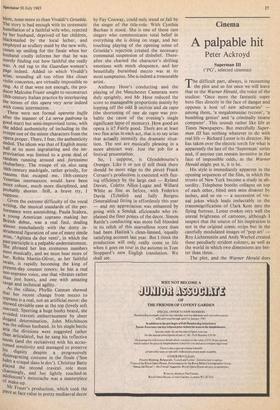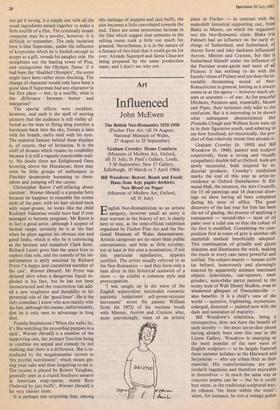Cinema
A palpable hit
Peter Ackroyd
Superman III
('PG', selected cinemas) The difficult part, always, is recounting the plot and so for once we will leave that to the Warner Herald, the voice of the studios: 'Once more the fantastic super hero flies directly in the face of danger and opposes a host of new adversaries' among them, 'a megalomaniac tycoon', 'a bumbling genius' and 'a criminally insane computer'. This sounds rather like life at Times Newspapers. But mercifully Super- man ill has nothing whatever to do with real life — Richard Lester is its director. He has taken over the electric torch for what is apparently the last of the 'Superman' series and, if anyone can remain inventive in the face of impossible odds, as the Warner Herald might put it, it is he.
His style is immediately apparent in the opening sequences of the film, in which the streets of New York become a study in ab- surdity. Telephone booths collapse on top of each other, blind men miss disaster by inches, and so on — a succession of vis- ual jokes which leads ineluctably to the transmogrification of Clark Kent into the flying fortress. Lester evokes very well the unreal brightness of cartoons, although I suspect that the source of his inspiration is not in the original comic strips but in the carefully modulated images of 'pop art' — Roy Lichtenstein and Andy Warhol created these peculiarly strident colours, as well as the world in which two dimensions are bet- ter than three.
The plot, and the Warner Herald does
not get it wrong, is a simple one with all the usual ingredients mixed together to make a little souffle of a film. The criminally insane computer may be a novelty, however: it is difficult to 'remember. The only variation here is that Superman, under the influence of kryptonite which he is foolish enough to accept as a gift, reveals his naughty side. He straightens out the leaning tower of Pisa, and extinguishes the Olympic flame: if it had been the 'disabled Olympics', the scene might have been rather more shocking. The change of character would only have been a good idea if Superman had any character in the first place — but, in a soufflé, what is the difference between butter and margarine?
The special effects were excellent, however, and such is the spell of moving pictures that the audience is still visibly af- fected as the man in flying drag punches a hurricane back into the sky, freezes a lake with his breath, melts steel with his eyes. The essential fantasy behind these displays is, of course, that of levitation. It is the stuff of dreams which retains its credibility because it is still a vaguely conceivable reali- ty. No doubt there are Enlightened Ones hovering above the Himalayas; there may even be little groups of enthusiasts in Finchley desperately humming to them- selves and jumping off the carpet.
Christopher Reeve ('self-effacing about stardom', Warner Herald) is a popular hero because he happens to resemble the screen idols of the past: with his hair slicked back with super-grease, he looks like the child Rudolph Valentino would have had if ever managed to become pregnant. Mr Reeve is in fact a good actor, although I suspect of limited range; certainly he is at his best when he plays against his obvious size and good looks, which is why he is convincing as the hesitant and maladroit Clark Kent. Richard Lester gives him the space here to explore that role, and the comedy of his im- personation is aptly matched by Richard Pryor ('a happy and committed member of the cast', Warner Herald). Mr Pryor was skinned alive when a dangerous liquid ex- ploded in his face, but he has not been reconstructed and the resurrection has add- ed a new toughness and durability to his perennial role of the 'good loser'. He is the only comedian I know who acts mainly with his feet, although this means, unfortunately, that he is only seen to advantage in long shot.
Pamela Stephenson ('When she walks by, it's like watching the proverbial puppies in a sack', Warner Herald) is a member of the supporting cast, her primary function being to combine sex appeal and comedy by not realising that there is a difference. She is in- troduced by the megalomaniac tycoon as 'my psychic nutritionist': which means get- ting your cake and then forgetting to eat it. The tycoon is played by Robert Vaughan, generally seen as a crazed Southern senator in American soap-operas. Annie Ross ('beloved by jazz buffs', Warner Herald) is his very sinister sister.
It is perhaps not surprising that, among
this melange Of puppies and jazz buffs, the plot becomes a little convoluted towards the end. There are some mysterious lacunae in the film which suggest that someone in the editing room took a little too much for granted. Nevertheless, it is in the nature of a fantasy of this kind that it could go on for ever. Already Supergirl and Santa Claus are being prepared by the same production team; and I don't see why not.







































 Previous page
Previous page